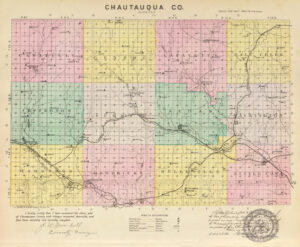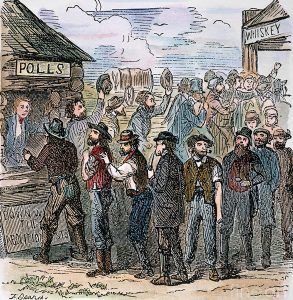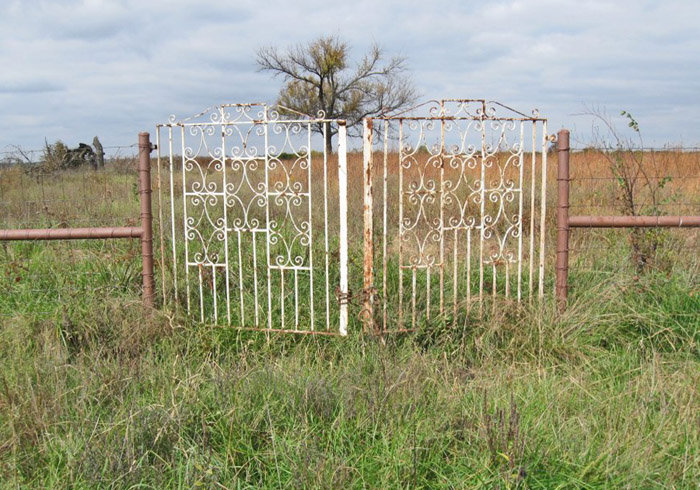Boston, Kansas, is an extinct town in Chautauqua County.
At the time Howard County was organized, the county seat was located at Elk Falls by the governor’s appointment. The question of its relocation was raised by parties at other points.
A petition was presented to the County Commissioners in the fall of 1870, requesting that an election be held to relocate the county seat. The petition was granted, and an election was held to remove the county seat from Elk Falls to Peru. However, many people were dissatisfied with this change. Some felt it was inconvenient for certain parts of the county, while others disagreed with the decision.
So great became the disaffection that it was deemed advisable to hold another election for a second relocation. In the meantime, a group of young men from the Osage Mission (St. Paul) in Neosho County established the new town of Boston, which gained a post office on August 28, 1871.
The election to relocate the county seat was held in September 1872, and the places voted for were Longton, Peru, Elk Falls, and Boston. On September 14, the County Commissioners met in Peru to canvass the vote. Upon opening the returns from Boston, Elk Falls, and Peru, they found such unmistakable evidence of fraud that they refused to canvass the vote and declared the election null. But the matter was by no means over. It was again debated and re-argued by perhaps what might be termed “would-be politicians,” who found no other “political provender” to feed upon.
An election was held on November 11, 1873, to determine whether Elk Falls or Boston should be the county seat. This resulted in a majority of 232 votes for Elk Falls. Although it was legally determined that a majority of the votes had been cast for Elk Falls as the county seat, the friends of Boston thought it ought not to be and were by no means to be robbed of what they deemed their just and legally acquired spoil. The Bostonians’ attempt to redress their injuries in the matter sparked what was known as the “Boston War.” The county officers had taken up their quarters at Elk Falls, where they were enjoined. But the brave men of Boston, fearing neither law, legal process, nor man, became bold in asserting their rights and maintaining justice. A resort to physical force was deemed necessary for this. On January 19, 1874, a posse comprising 24 wagons and 150 armed Boston men entered the town of Elk Falls and, amid the consternation, threats, and tears of the inhabitants, began loading the records and county property upon their wagons and then started for Boston.
Attempts to recover the stolen property were made hastily. Appeals for aid were addressed to the Kansas Governor, Legislature, and the Adjutant General. Three militia companies were organized in the county to recover the records and apprehend the possessors, but to no avail. The county seat was gone, and for some time, enjoyed a migratory existence, having been trailed on the wagons through the Flint Hills.
The time for the district court to convene arrived. Honorable W.P. Campbell, the district judge, was present, but the books and records were missing, which defeated the course of justice. The Judge, however, set about recovering possession of them and began by placing several parties who had been engaged in the removal under arrest for contempt of court. This began to give things a more serious aspect, and the plotters began to weaken.
The release of those under arrest was promised, provided they surrendered the records and other county property unconditionally, which was done quickly. Thus, it effectively ended the warfare without bloodshed, and the county seat remained at Elk Falls until the county was divided in 1875.
Soon, along came the railroad and the creation of Moline, two miles to the north, which spelled the end of Boston, Kansas. Its post office closed on September 1, 1879, and was moved to Moline. All that is left of Boston today is the Old Boston Cemetery.
©Kathy Alexander/Legends of Kansas, updated January 2026.
Also See:
Chautauqua County Photo Gallery
Sources:
Blackmar, Frank W.; Kansas: A Cyclopedia of State History, Vol I; Standard Publishing Company, Chicago, IL 1912.
Cutler, William G; History of Kansas; A. T. Andreas, Chicago, IL, 1883.



